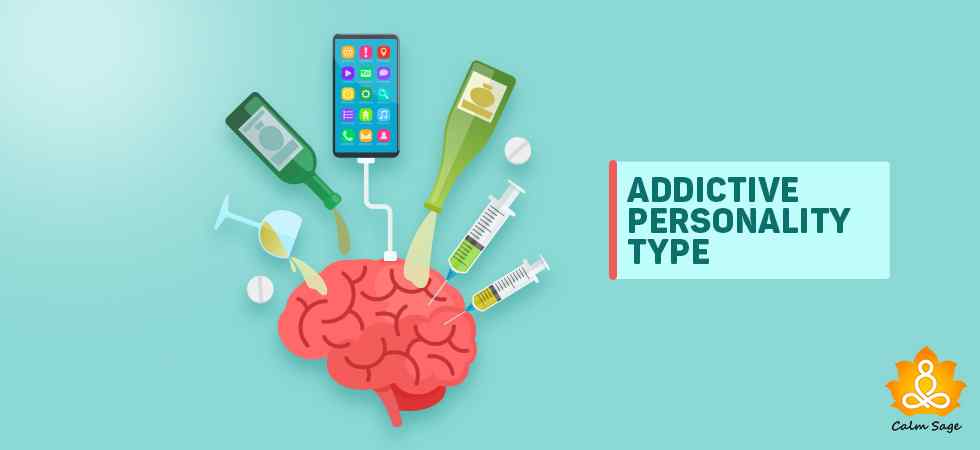Addictive Personality Disorder | Is It A Real Disorder Or A Myth?

We’ve all heard of how addiction, a major health concern, can affect anyone regardless of their behaviors and traits. While many people consume alcohol and drugs occasionally, they might not be addictive if they do not seek active consumption of these products. And even then, many people might find themselves getting addicted to behaviors such as gambling.
Addiction is a complex yet serious concern but the question that remains is whether addiction to substances or behaviors is a personality trait or a result of our brains learning the effect of drugs on our individuality and other environmental factors that contribute to the addictive behaviors.
Let’s clear one thing first: While many people like to use ‘addictive personality disorder’ to justify others’ actions (or their own), it’s not a real disorder but a myth. In this blog, let’s take a look at what an “addictive personality” is, its impact, traits, and more…
What Is Addictive Personality Disorder?
With the conception of the Twelve Step program and Alcoholics Anonymous, many considered thinking about addiction as a medical concern instead of a moral failing. As the program developed, new models were introduced and addiction was viewed as more than just a behavioral problem.
Addictive personality disorder can be defined as a set of personality traits that causes one to be more prone to addiction than others. While, in recent years, the term “addictive personality” has become quite popular, there has been almost no evidence that speaks or supports the idea of an addictive personality.
Some personality traits can be associated with addictive behaviors but there is no medical evidence that supports the idea that addictive personality disorder is real. Various factors including genetics, family history, socio-economic status, and environmental factors can (and very likely) play a role in determining addictive behaviors and addiction.
Some of the common personality traits or signs of an addictive personality or addiction include:
- Impulse control or impulsivity
- Insecurity
- Irritability
- Mood swings
- Poor self-esteem
- Unhealthy coping skills
- Selfishness
- Social withdrawal
- Risky behaviors
- Attention-seeking behaviors
- Sensation-seeking behaviors
Why The Concept Of Addictive Personality Is Problematic?
Many critics believe that using “addictive personality” as a label can encourage mental health stigmas instead of preventing them. The problem lies when this term turns into a complicated issue that raises problems such as:
1. Makes people underestimate the behavioral risk:
When people believe that it’s their personality disorder making them addicted to either substances or behaviors (or both) makes them underestimates the risk of developing an addiction. They may incorrectly assume that because they don’t have “addictive personality traits”, they are not at risk.
2. Causes negative stereotypes to rise:
When one believes in the reality of addictive personality disorder, it can increase the stigma and cause people to believe in the negative stereotypes regarding people with addictions.
3. Lowers their motivation to employ a change in their behaviors:
When people believe that it’s their addictive personality disorder at play, it can reduce their motivation to actively seek change in their risky behaviors. They may assume that they are just more prone to addiction and there’s not much they can do to prevent or avoid risky behaviors.
Potential Risk Factors Of Addictive Behaviors
Research does not actively support the idea of addictive personality disorder but many researchers believe that there are many factors – non-personality ones – that may contribute to addiction and addictive behavior.
Some of these risk factors of addictive behavior can include:
1. Family History:
If there’s a family history of addiction or a genetic connection with a family member with an addiction, then certain traits such as impulsivity and sensation-seeking behaviors might be inherited. However, having these traits does not mean that you will automatically develop an addiction. It just means that you might be more likely to develop an addiction.
2. Environmental Factors:
Even some environmental and socioeconomic factors such as poverty, easy access to alcohol or drugs, past trauma, and unhealthy coping behaviors might also contribute to addiction.
3. Mental Health Disorders:
Depression, bipolar disorder, trauma, or post-traumatic stress disorder (PTSD) can also increase your risk of developing an addiction or addictive behaviors.
Addictive Behaviors To Look Out For
If you have a higher risk of developing addictive behaviors, then here are some behaviors that might cause problems for you in the future:
1. Comfort Eating:
Many people, when they feel particularly emotional, tend to engage in comfort eating to feel better. While this behavior isn’t harmful, it can become a habit (later a trait) and can cause obesity, addiction to food, and binge eating that can be harmful.
2. Consuming Alcohol Socially:
Another behavior that can make you susceptible to addiction is consuming alcohol socially. While a glass of wine or a pint of beer can seem like a quick way to lower stress, eventually, it can become an addictive trait.
3. Being Hyperconnected:
Another addictive behavior is constantly checking your social media and notifications, never letting your smartphone out of your reach. While it’s okay to spend some time scrolling through your social media, constant activity can cause internet addiction and can eventually lead to compulsive behavior such as shopping, sex, and gambling.
4. Compulsive Shopping:
Shopping can make anyone feel good but when things go out of control and shopping turns into compulsive shopping to a point where you are in debt or at least at the risk of debt, things can take a turn for the worse.
5. Self-Medicating:
When you’re struggling to cope with trauma and pain, recreational drugs can seem a good option to help with the psychological pain, at least temporary but if you’re not careful, this temporary habit can become an addiction that can be harmful to your overall health.
How To Avoid Risky Behaviors?
If you’re looking for addictive personality treatment, then it is recommended that you speak to a professional, seek the right advice, and the right treatment program. If you are concerned about your (or your loved one’s) risky behaviors, then here are a few things that can help you control your behavior:
1. Engage In Healthy Self-Care Practices: Instead of engaging in binge eating or drinking, you can engage in healthy self-care practices such as meditation, a warm bubble bath, and a good night’s rest.
2. Limit Alcohol, Socially: Instead of consuming alcohol-based beverages when in social settings, choose non-alcoholic beverages or water. When others are getting drunk, try to say no to alcoholic drinks as much as you can.
3. Reduce Your Social Media Time: Instead of choosing to spend time scrolling through your social media, try to set a limit on your social media apps and put your phone notifications on silent, especially during evening hours.
4. Seek Professional Help: If you’re not able to overcome your addictive behaviors and believe that you’re at a high risk of developing an addiction or addictive traits, then seek professional help immediately.
5. Try Relaxation Activities: If you believe that you’re getting addicted to recreational drugs to reduce stress, try to look at other, healthier stress management activities than choosing drugs to relax.
Now that you know addiction to substances and behaviors are likely caused by external factors rather than personality traits, you can learn to avoid risky behaviors and control your behaviors before they become more than what you bargained for.
An addictive personality disorder is a myth and not a real disorder and you can put it behind you if you intervene at the right moment. Some of your personality traits might contribute to your addictive behaviors but it does not mean that they are the only factors contributing to your addiction.
Living (and dealing) with addiction can be quite complicated and can affect anyone regardless of their personality traits. If you or your loved one are at risk of developing addictive behaviors, then you can reach out to a professional and seek the right counsel.
If you or someone you know are struggling with behavioral addiction, you can contact these helpline numbers:
- SAMHSA National Helpline: 1-800-662-4357
- The National Mental Health Association: 800-969-6642
- National Suicide Prevention Lifeline: 988
- Alpha Healing Centre: 1800-547-2060
- Veda Rehabilitation And Wellness: (+91) 81518 30000
Help is available! No matter what your addiction is! You can also write to us at info@calmsage.com or DM us on social media for more. Let us know what you think about addictive personality disorder in the comments below.
Take Care!





















Love how the article focused more on the behaviors versus personality traits. Addictive personality disorder has been a stigmatizing word used for the longest which limits how society and professionals approach individuals and the potential risk factors associated. I'd like to see more articles and research done on this topic.
Hey David, Thank you for Sharing your Feedback and Suggestion. We have added this suggestion in our bucket list. If you have got more suggestions or feedback feel free to contact us over info@calmsage.com